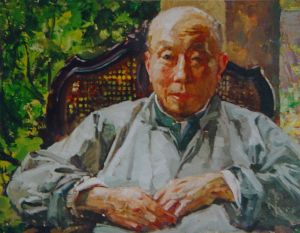Difference between revisions of "Yan Wenliang"
imported>Ciic m |
imported>Ciic |
||
| Line 1: | Line 1: | ||
'''Yan Wenliang''' (Chinese: 颜文樑) was one of the first-generation Chinese oil painters. He was a leading apostle of reality - "Reality comes before beauty" and, "creativity is possible if and only if one is lavishly equipped with the skills of sketching and oil painting" were core tenets of his philosophy. | '''Yan Wenliang''' (Chinese: 颜文樑) was one of the first-generation Chinese oil painters. He was a leading apostle of reality - "Reality comes before beauty" and, "creativity is possible if and only if one is lavishly equipped with the skills of sketching and oil painting" were core tenets of his philosophy. | ||
| − | [[File:Yan's representative work-Kitchen (1920).jpg|thumb|right|Yan's representative work-Kitchen (1920)]] | + | [[File:Yan's representative work-''Kitchen'' (1920).jpg|thumb|right|Yan's representative work-''Kitchen'' (1920)]] |
Born in 1893 in southeast [[China]]'s city of [[Suzhou]], Yan learned traditional Chinese painting from his father when he was a child. With friends, he established the [[Suzhou Fine Arts College]] in 1922. Yan went to France for further studies in 1928 when he was influenced by Western art concepts and skills. Later he returned home to shape the development of modern art. | Born in 1893 in southeast [[China]]'s city of [[Suzhou]], Yan learned traditional Chinese painting from his father when he was a child. With friends, he established the [[Suzhou Fine Arts College]] in 1922. Yan went to France for further studies in 1928 when he was influenced by Western art concepts and skills. Later he returned home to shape the development of modern art. | ||
Revision as of 08:50, 22 April 2010
Yan Wenliang (Chinese: 颜文樑) was one of the first-generation Chinese oil painters. He was a leading apostle of reality - "Reality comes before beauty" and, "creativity is possible if and only if one is lavishly equipped with the skills of sketching and oil painting" were core tenets of his philosophy.
Born in 1893 in southeast China's city of Suzhou, Yan learned traditional Chinese painting from his father when he was a child. With friends, he established the Suzhou Fine Arts College in 1922. Yan went to France for further studies in 1928 when he was influenced by Western art concepts and skills. Later he returned home to shape the development of modern art. According to Zhao Li, professor of Central Academy of Fine Art, Yan used Western painting skills but kept with traditional Chinese art philosophy. Take his watercolor Grandma's Sister for an example, Instead of drawing still models as Western artists do, Yan challenged his memory and accuracy by painting his relative as she was doing housework. He used freehand drawing to capture the mood and movement rather than precisely drawing every detail. And, small empty areas implied the changing light – a classic technique of traditional Chinese painting.
Zhao believes that it was the Chinese spirit expressed in his works – not his Western painting skills – that made Yan stand out among his peers. Yan also went outside to paint, unlike his peers who remained in their studios. His most common subjects included people and sceneries. His works have been auctioned by Christie's and Sotheby's.
